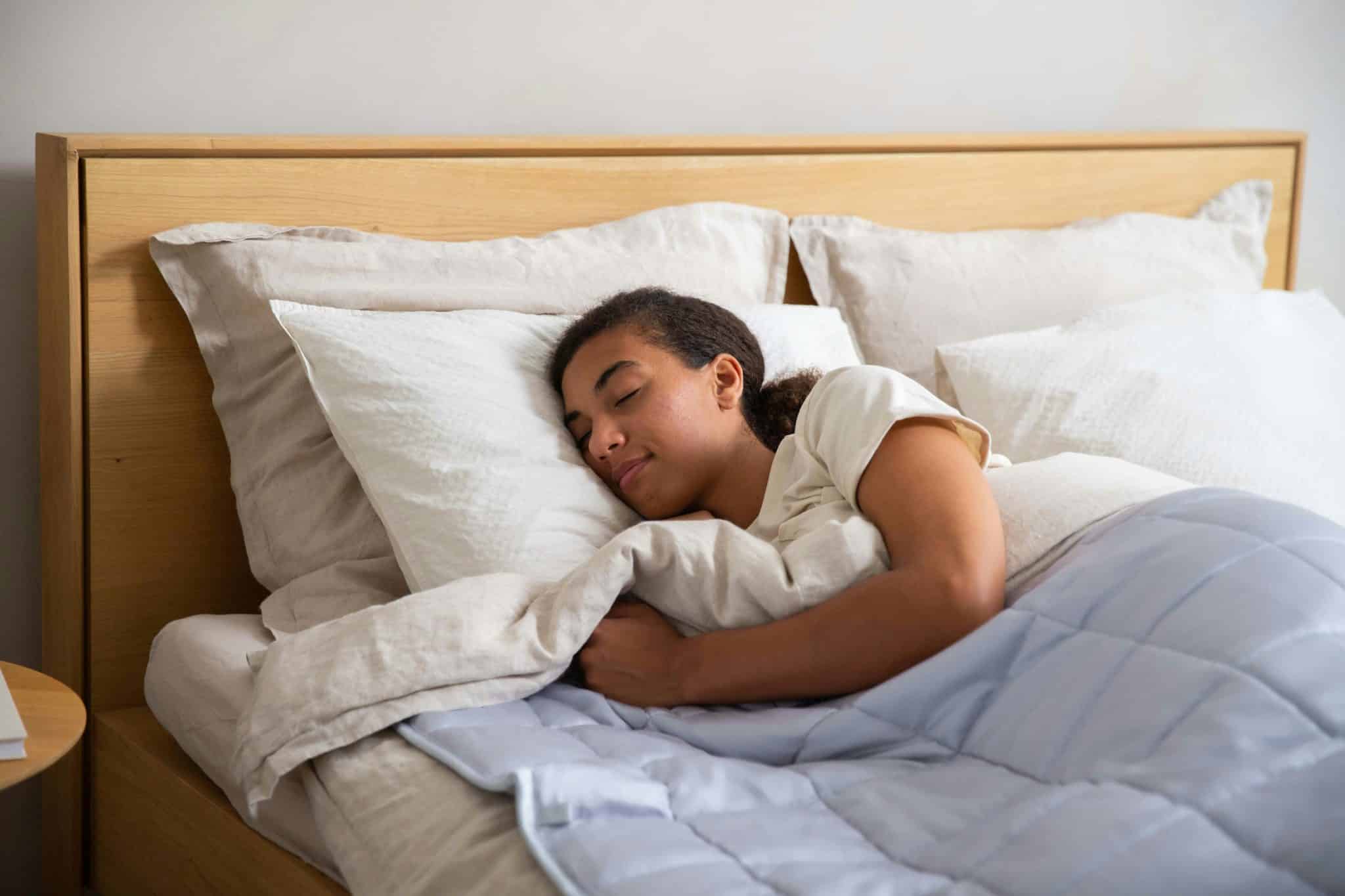Why Sleeping with Air Conditioning On Changes Your Sleep Quality: Expert Facts
Your sleep quality changes by a lot when you sleep with the air conditioner on. Most people don’t realise this effect. Research shows that the right temperature helps you sleep better without waking up often. The sweet spot for your bedroom temperature should stay between 17 and 19 degrees Celsius. Room temperatures above 21 degrees can mess with your rest.
Remember those summer nights when you couldn’t sleep because of the heat? Air conditioning makes your bedroom more comfortable by keeping both temperature and humidity in check. This helps you drift off faster and sleep better through the night. But there’s more to it than just comfort.
A study revealed that people slept for 466.8 ± 60.8 minutes with air conditioner sounds compared to 478.8 ± 55.4 minutes without them. This brings up some interesting questions about the best air conditioning temperature for sleep and how its sound might affect your sleep patterns. In this piece, BG Electrical & Air Con – Brisbane Air Conditioning Experts will discuss these factors and answer a common question: Does sleeping with the air conditioning on harm your health?
Getting Professional Air Conditioning Help
With hot, humid summers and warm nights, having a properly functioning air conditioning system is essential for quality sleep. If your current system isn’t keeping your bedroom at the optimal temperature range, it might be time to consider professional air conditioning installations.
Whether you need a new air conditioner, repairs to your existing system, or advice from air conditioning specialists, professional servicing can ensure your unit operates efficiently throughout the year. Regular air conditioning installation services and maintenance help prevent the common issues that can disrupt your sleep, such as inadequate cooling, excessive noise, or poor air quality.
How air conditioning affects your sleep cycle
Temperature regulation in your body is vital to how well you sleep. The way air conditioning and sleep work together involves complex processes in your body that affect how fast you drift off and how refreshing your sleep becomes.
Understanding the human sleep cycle
Your body moves through four different sleep stages at night – three non-REM stages and then REM sleep. A complete cycle usually takes about 90 minutes. The first cycle tends to be shorter at 70-100 minutes, while later cycles stretch to 90-120 minutes. These cycles change throughout the night. Deep sleep (stage 3) dominates early cycles, and REM sleep becomes more common later.
Stage 3 sleep, also called slow-wave sleep, helps your body recover and supports immune function and cognitive processes like memory consolidation. REM sleep – marked by rapid eye movements and increased brain activity – helps with learning and creativity. Both stages help you wake up feeling refreshed, but temperature changes can easily disrupt them.
How temperature influences sleep stages
Your core body temperature naturally shifts about 2 degrees Celsius during the night. This cooling starts about two hours before bedtime, right when your body releases melatonin, the sleep hormone. Using air conditioning can help this natural cooling process and might improve your sleep quality.
Research shows sleep works best in rooms between 15.6°C and 18.3°C. Temperatures outside these ranges can substantially affect your sleep patterns. Heat makes you wake up more often and reduces both slow-wave and REM sleep. High humidity makes these effects worse by putting more thermal stress on your sleeping body.
Why airflow matters during light and REM sleep
Cool air helps you sleep, but direct airflow from your air conditioner can make sleep quality worse. Studies show people sleeping under stronger airflow wake up more often, have faster heart rates, and move around more. Light sleep (stages 1 and 2) is particularly sensitive to these disruptions, with more frequent wake-ups than during deep sleep.
REM sleep brings its own challenges because your body temporarily loses its ability to control temperature through sweating or shivering. Poor air conditioner placement or settings can create uncomfortable temperature changes when your body cannot handle them well.
The pros and cons of sleeping with air conditioning on
Air conditioners do more than just make you comfortable while sleeping. The science of temperature control explains why we depend on air conditioning units to get better rest.
Benefits: temperature control and comfort
You’ll sleep better with air conditioning because it keeps your bedroom temperature between 15-19°C. Your body naturally cools down during sleep, and this temperature range supports that process. Research shows that your skin temperature needs to stay between 33.5-35.5°C. Any changes outside this range will disturb your sleep and reduce deep sleep phases.
Air conditioners do more than control temperature – they also lower humidity levels to make your sleep environment more comfortable. The right humidity level (30-50%) helps you avoid night sweats that can wake you up. On top of that, it filters out dust, allergens and pollutants so you breathe clean air while sleeping.
Drawbacks: dry air, noise, and overcooling
All the same, sleeping with the air conditioning on comes with some downsides. The air gets dried out, which can make your skin dry, eyes irritated, and breathing uncomfortable. This lack of moisture might inflame your sinuses and cause congestion and sneezing.
The noise from your air conditioning unit can affect how well you sleep. Studies show people had more sleep interruptions (30.4 ± 12.9 vs. 25 ± 12.2) on nights with air conditioning sounds compared to quiet nights. Even gentle air blowing directly on you can reduce sleep quality at speeds under 0.2 m/s.
Too much cooling brings its own risks. Room temperatures that drop well below 25°C can cause dangerous body temperature changes, leading to stiff muscles, achy joints, and poor sleep.
Is sleeping with air conditioning on bad for you?
Sleeping with the air conditioning running isn’t automatically bad for your health, but you need to use it properly. Most health issues come from wrong settings and poor maintenance rather than the air conditioning itself. To get the best results, keep temperatures between 24-26°C, point the airflow away from your face, and clean your filters regularly to stop germs and allergens from building up.
Optimising your air conditioning for better sleep
The right air conditioner settings can change your sleep environment from just comfortable to truly sleep-enhancing.
Ideal air conditioning temperature for sleeping
Research shows you’ll sleep best with your air conditioning set between 18.3°C and 20°C. All the same, your ideal temperature changes with seasons and climate. Summer nights are more comfortable between 22-24°C, while winter nights need a cooler 19-21°C. People living in humid areas should set their air conditioning to 25°C to stop condensation from building up on ductwork and grilles.
Using sleep mode and programmable settings
Today’s air conditioners come with sleep mode that matches your body’s natural temperature changes throughout the night. This feature typically raises the temperature by 0.5-1°C each hour, up to 3°C total. These gradual changes give you several benefits:
- Your comfort stays consistent as your body temperature naturally changes
- Your energy use and electricity bills go down
- Your unit runs more quietly since it doesn’t work as hard
Some of the newest models have movement sensors that notice when you’re restless and adjust the temperature to help you sleep better.
Avoiding direct airflow on your body
Your air conditioner should sit on either side of the bed or on the opposite wall – never right above where you sleep. Keep any portable units at least 2-3 metres from your body to avoid concentrated airflow. You can also use the oscillating feature to prevent constant direct air, which disrupts sleep even at low speeds.
Maintaining good air quality with filters
Your air filters need cleaning every 1-2 months to keep your air clean and your unit working well. Regular cleaning stops dust mites, bacteria, and allergens from building up and disturbing your sleep. Anyone with breathing sensitivities should think about special filters that catch irritants like pollen and microbes. Clean filters create a healthier sleep environment, especially when you have allergies.
Other factors that influence sleep quality with air conditioning
Several factors beyond temperature control determine how sleeping with air conditioning affects your rest quality. A good understanding of these elements helps you create the perfect sleep environment year-round.
Air conditioner sound and white noise
Your air conditioner’s subtle hum does more than make background noise. Nearly 5% of Americans use sound generators like fans and air conditioners that mask ambient noise and promote sleep. The white noise works by reducing the gap between background sounds and disturbing noises, which could raise your arousal threshold. Research shows mixed results about air conditioning sound benefits. Studies indicate more sleep bouts (30.4 ± 12.9 vs. 25 ± 12.2) during nights with air conditioning sounds, though some people find the steady sound calming.
Humidity levels and their impact
Experts suggest indoor humidity should stay between 40% and 60% for optimal sleep. High moisture levels increase wakefulness and cut down time spent in significant slow-wave and REM sleep stages. Damp environments help mould grow and dust mites thrive, which might trigger allergies that disrupt sleep. The flip side shows that dry air from extended air conditioning use can lead to dry skin, irritated nasal passages, and throat discomfort. These conditions often make breathing problems worse.
Seasonal changes and air conditioning usage habits
Your air conditioning needs naturally change with seasons. The indoor humidity should stay between 30-50% to ensure quality sleep, whatever the outside temperature. You should adjust your air conditioning settings as seasons change instead of stopping use completely. Many people report poor sleep during winter without their air conditioning. The best approach to year-round comfort suggests using your air conditioning with a humidifier in drier months.
Conclusion
Your sleep quality changes when you sleep with the air conditioner running. The benefits depend on how you use it. Research shows that temperature control plays a crucial role in getting good sleep. Most people sleep best in temperatures between 17-19°C.
The right temperature setting is different for everyone. Your body naturally cools down during sleep, especially in REM and deep sleep phases. A properly controlled room temperature helps this natural process work better.
Without doubt, air conditioning does more than just cool the room. Clean filters remove allergens from the air. Good humidity control stops you from getting sweaty at night. Modern air conditioning units come with sleep modes that work with your body’s natural temperature changes.
You should watch out for some downsides. Dry air can make your throat and nose uncomfortable. Direct air flow might make your muscles stiff or wake you up. Light sleepers might struggle with noise from older air conditioning units.
The right setup makes a big difference. Your air conditioning shouldn’t blow directly above your bed. Clean the filters regularly and adjust the settings as seasons change. These simple steps help turn your air conditioning into a sleep-friendly device.
Your bedroom environment needs the right temperature and humidity levels. Everyone has different needs, but research proves that sleeping with air conditioning works well if you use it correctly. Success comes from how you integrate air conditioning into your nig








